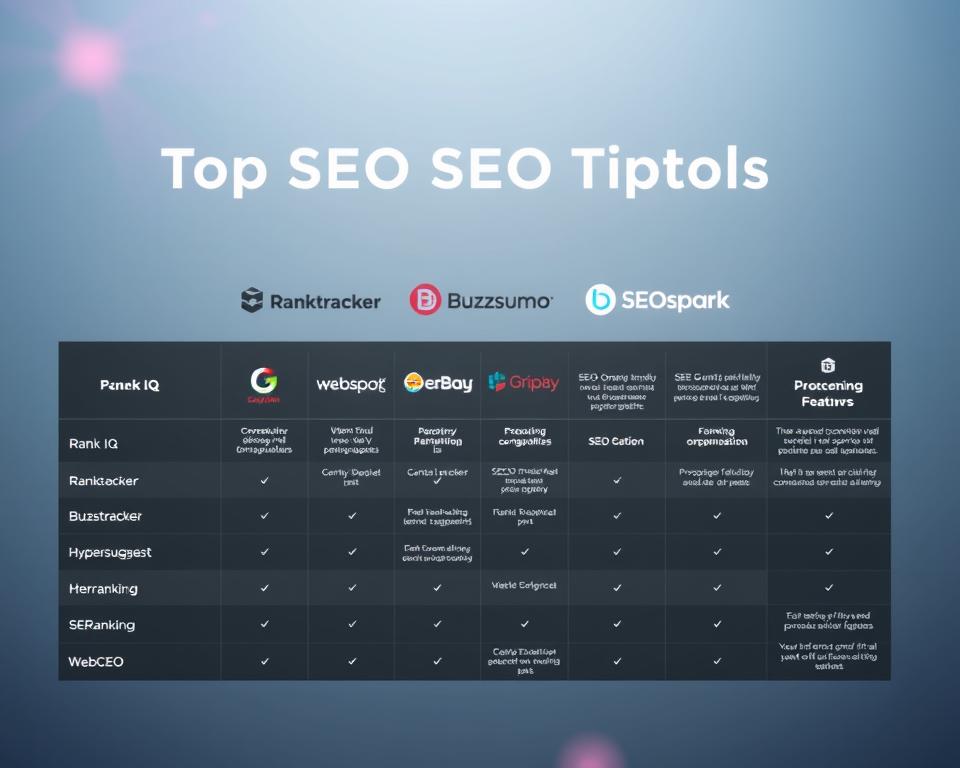![]()
Imagine your website jumping ahead of competitors and attracting thousands more visitors—all without guessing what works. In today’s digital world, choosing the right tools matters more than ever. Top SEO Tools like SEMrush, Ranktracker, and Buzzsumo empower businesses with data-driven strategies to boost rankings and drive targeted traffic.
SEO tools make complex tasks easy. They help find high-traffic keywords with little competition and spot backlink gaps quickly. This guide shows how tools like HyperSuggest and SEranking can turn data into steps for better search rankings and digital marketing success.
Key Takeaways
- Over 105 SEO tools, including 60+ free options, cater to all budgets and skill levels.
- SEMrush’s 20 billion-keyword database outperforms smaller tools in competitive analysis.
- Tools like Keysearch ($17/month) offer affordable alternatives to premium software like SEMrush Pro ($119/month).
- Technical SEO essentials like Google PageSpeed Insights and Screaming Frog are free yet powerful.
- Long-tail keywords and keyword difficulty analysis tools help target niche audiences effectively.
Why the Right SEO Tools Matter for Your Digital Success
In today’s digital world, the right SEO tools are key for boosting website traffic and better search rankings. With over 300 SEO tools, picking the right ones is crucial for your digital success. Thanks to innovative strategies, companies using these tools have seen their sites get 500k+ monthly visitors.
A good SEO investment gives you insights to increase organic visibility. Tools like SEMrush and Ranktracker help track keyword performance and determine what competitors are missing. For instance, SEMrush’s Pro plan ($119/month) offers deep analytics, while Keysearch ($17/month) is great for finding keywords without spending a lot.
- Track search rankings daily to adjust content strategies.
- Identify high-value keywords to drive website traffic and conversions.
- Free tools like Google Analytics and Screaming Frog can audit site performance without high costs.
Not using SEO tools can let competitors pass you by. Tools like AHREFs and Moz give you data to make wise decisions, ensuring your digital success isn’t just luck. Focusing on these tools makes your SEO investment work for your long-term goals, turning organic visibility into a lasting edge.
Understanding Modern SEO Tools and Their Core Functions
Modern SEO tools make complex tasks easier and have special functions for different needs. There are over 240 tools, 56.7% of which are for keyword research. These tools use data to help improve rankings and traffic.
Most keyword research tools work the same way: Enter a seed keyword and get related terms. The problem? Everyone uses the same seeds. Instead, ask customers how they search for you.
Keyword Research Capabilities
Tools like Ranktracker and Hypersuggest study search patterns. Ranktracker uses a huge backlink database to check keyword difficulty. HyperSuggest groups terms, saving 40% of research time.
Its $15 starter plan saves $35/month. This makes it a great value.
Backlink Analysis Features
Tools like Ahrefs and SEMrush track backlinks to boost domain authority. Backlink analysis finds broken links or toxic profiles, which are key for rankings. Over 136 tools focus on this, with an average PA score of 54.5.
Competitor Analysis Functions
Tools like Buzzsumo show top content and influencers. SEMrush’s competitive audit module compares backlinks and keywords. 9 tools specialize in this, helping users find market gaps.
Technical SEO Audit Tools
Tools like Screaming Frog and Google PageSpeed Insights check site speed and mobile responsiveness. A 54.5 average PA score shows room for improvement.
With 20+ technical SEO tools, picking the right mix is key. Start with free trials, like SEMrush’s 7-day option, to test before committing.
Ranktracker: The All-in-One SEO Solution
Ranktracker’s Ranktracker features bring eight key tools together in one place. This makes SEO easier to manage. Its keyword finder finds promising terms from a global database. The SERP checker looks at search results, using data from 3 trillion backlinks.
The website auditing tool spots technical problems. As rank tracking software, it keeps an eye on rankings across different search engines and places.
- Keyword Finder: Global keyword database with search volume and difficulty metrics
- SERP Checker: Historical data for tracking competitor visibility shifts
- Website Auditing: Prioritizes critical SEO issues like broken links and crawl errors
- Backlink Analysis: Monitors toxic links and competitor backlink profiles
| Feature | Ranktracker | Competitor Tools |
|---|---|---|
| Keyword Research | Integrated with search volume analytics | Requires multiple tools for full coverage |
| Rank Tracking | Real-time updates across 200+ search engines | Limited to top 3-5 engines |
| Audit Tools | Automates on-page fixes and prioritizes fixes | Typically requires third-party integrations |
Ranktracker offers a free SERP simulator for testing title and meta descriptions. Its design is easy to use, helping small businesses get into advanced SEO. Unlike others, Ranktracker’s all-in-one dashboard saves money by 50% compared to buying tools like SEMrush or Ahrefs separately.
Exploring the Power of Buzzsumo for Content Marketing
Buzzsumo helps marketers find top content trends and improve social media plans. It shows which topics are popular across different platforms. It also compares how well different posts perform.
Users can see which posts do well and try to make similar content. The platform finds micro-influencers with active followers, making it easier to work with them. It also tracks shares and backlinks in real-time to help improve social media strategies.
- Content Discovery: Analyze trending topics and viral posts in your niche
- Influencer Identification: Locate niche-specific influencers with verified social authority scores
- Performance Tracking: Measure shares, backlinks, and engagement rates for all published content
Using Buzzsumo with tools like Morningscore helps check if topics match what people are searching for. This ensures content meets audience needs and follows SEO rules.
For instance, Buzzsumo found that listicles and how-to guides get 40% more shares than usual. This information helps teams focus on formats that work best for social media.
Ranktracker Buzzsumo Hypersuggest SEranking WebCEO Serpstat LongTail Pro SEMrush: A Comprehensive Comparison
Choosing the right SEO software is all about finding the best value. This SEO tools comparison looks at eight top platforms. It helps find the best SEO solutions for different needs. We check everything from features to how well they scale.
Pricing Structure Comparison
SEMrush Pro and Ahrefs are for big budgets. But, 7 other tools have more affordable options. Hypersuggest starts at just $15/month, perfect for small businesses. Free trials and discounts, like SEMrush’s 14-day trial, make it easy to test.
For small teams, Serpstat ($49) or LongTail Pro ($37) might be the best. They offer great features at a lower cost.
User Interface and Experience
- SEMrush’s dashboard has 20 tools for smooth workflows.
- Hypersuggest makes keyword analysis simple with its intuitive design.
- Ranktracker simplifies technical SEO tasks with its all-in-one package.
Feature Set Evaluation
Buzzsumo is great for finding content. SEMrush has a huge 20B keyword database for deep analysis. Serpstat and WebCEO offer special features like PPC insights and white-label solutions.
SEranking combines rank tracking with social analytics for a complete campaign view.
Best Tool for Different Business Sizes
- Best SEO solutions for SMBs: Hypersuggest ($15) or LongTail Pro ($37)
- For big businesses: SEMrush or Ahrefs for everything you need
- Freelancers: Start with free tools like Google’s Search Console
Looking at these SEO platforms review options helps match your team’s skills and budget.
Hypersuggest and LongTail Pro: Mastering Long-Tail Keywords

Long-tail keywords are crucial for finding specific audiences. Hypersuggest and LongTail Pro are great at finding these hidden gems. They focus on low competition keywords that attract the right people.
Hypersuggest uses search engine data to find new keywords. Its $15/month plan also includes tools to group these keywords by topic. It’s perfect for finding content ideas from forums and social media.
LongTail Pro helps you understand how competitive keywords are. It shows what content is currently ranking well. This helps you find gaps to fill. Even though pricing is not shared, it has advanced filters for finding the most profitable keywords.
| Tool | Key Features | Pricing | Best For |
|---|---|---|---|
| Hypersuggest | Keyword clustering, autocomplete analysis | $15/month | Content planners needing rapid keyword ideas |
| LongTail Pro | SERP analysis, keyword difficulty scores | Custom plans | SEO teams targeting low-competition niches |
Both tools help you avoid keywords that are too crowded. Hypersuggest finds new questions, while LongTail Pro shows you low competition keywords with good ranking chances. Using these tools with SEMrush or Ahrefs can make your strategies even stronger.
Maximizing Results with SEranking, WebCEO, and Serpstat
Over 34% of SEO tools focus on keyword research, but top platforms like SEranking, WebCEO, and Serpstat integrate advanced features to drive measurable growth.
SEranking offers site audit tools and backlink monitoring software for easier technical SEO. It starts at $39/month and includes keyword tracking and competitive research. Users have seen mixed results in link analysis, but recent updates might have fixed this. You can try its competitive SEO analysis modules for 14 days.
WebCEO is great for agencies with its white label SEO reports. It has tools for social analytics and rank tracking, making work easier for teams. Its site audit tools find technical problems, and you can rebrand reports for clients.
Serpstat offers competitive SEO analysis and PPC insights, checking over 20 billion keywords. It spots bad backlinks and predicts search trends. For $99/month, you get historical data and AI tips.
| Tool | Pricing | Core Features |
|---|---|---|
| SEranking | $39/month | Keyword tracking, site audits, 14-day trial |
| WebCEO | Custom pricing | White label reports, social analytics |
| Serpstat | $99/month | Backlink analysis, PPC insights |
These tools help with competitive SEO analysis and technical work. They’re perfect for agencies wanting white label SEO reports or backlink monitoring software. They offer great value without breaking the bank.
Implementing SEO Tools Into Your Marketing Strategy
Integrating SEO tools into your workflow is key. Start by aligning SEO workflow integration with your business goals. Use data-driven SEO to set clear objectives like increasing traffic or boosting conversions.
Here are some steps to follow:
- Standardize processes: Create guides for keyword research, backlink analysis, and content audits.
- Integrate with existing platforms: Link tools like SEMrush with Google Analytics and CRM systems.
- Train teams: Use SEMrush’s tutorials or Ahrefs’ certifications to ensure staff understands SEO reporting features.
- Automate reporting: Schedule weekly SEO reporting dashboards in Serpstat to track rankings and traffic.
- Review quarterly: Assess tool performance against KPIs to optimize budgets and tool selections.

| Stage | Tools | Key Features |
|---|---|---|
| Keyword Strategy | Ranktracker, LongTail Pro | Keyword clustering, search intent analysis |
| Content Optimization | Buzzsumo, GrowthBar | Social share tracking, competitor content analysis |
| Technical SEO | Screaming Frog, SEMrush | Crawl errors, site speed analysis |
| Reporting | SEMrush, Serpstat | Customizable dashboards, trend comparisons |
Effective SEO workflow integration demands regular audits of tool performance. Use free trials like SEMrush’s 14-day option to test tools before scaling. Prioritize tools offering API integrations (e.g., SEranking) to streamline workflows. For small teams, budget-friendly options like Keysearch ($17/month) can handle core functions without overspending.
Always map tool functions to specific objectives. Use Backlink Anchor Text Analyzer for link audits or Google’s free tools for technical checks. Continuous improvement through data-driven SEO ensures tools evolve with your marketing goals.
Conclusion: Selecting the Right SEO Tools for Your Specific Needs
Choosing the right SEO tools is about matching them to your company’s goals. First, figure out what you need, like keyword research or technical audits. Small teams can start with affordable tools like Keysearch ($17/month) or free tools like Google Search Console.
Larger businesses might prefer all-in-one platforms like SEMRush ($119/month) for detailed data. But, it’s important to check if the cost is worth it. Compare the features to see if they meet your return on investment.
When planning your SEO budget, think about what you get for your money. Tools like RankIQ ($50/month) offer smart insights at a good price. Free trials, like SEMRush’s 14-day one, can help you see if a tool fits your needs.
A spreadsheet with 105 tools shows options for every budget. Make sure the tools you choose work well with your current SEO setup. For example, you could link Ahrefs’ backlink data with Google Analytics.
For custom SEO solutions, you might need to mix different tools. Content teams could use Buzzsumo for social performance and Surfer SEO for AI suggestions. Technical teams need tools like Screaming Frog for site audits and SEMRush’s huge keyword database.
Always test free trials to see if tools fit your workflow and give useful insights. The SEO tool world changes fast, so check your tools regularly. Beginners might like Mangools, while advanced users might prefer Moz Pro ($99/month) for deeper backlink analysis.
Remember, your SEO tool setup should grow with your business. Start simple, add more tools as needed, and focus on tools that help you meet your goals.
FAQ
What are the best SEO tools available in 2025?
The top SEO tools for 2025 include Ranktracker, Buzzsumo, and Hypersuggest/seospark. SEranking, WebCEO, Serpstat, and SEMrush are also great. Each tool focuses on different SEO aspects.
Why is it important to use SEO tools?
SEO tools provide vital data and insights. They help businesses see how search engines view their sites, show where to improve, and track progress. These tools save time and help make better decisions.
How can Ranktracker benefit my business?
Ranktracker has a simple interface with advanced features. It tracks keywords, does technical audits, and analyzes backlinks. It’s perfect for small businesses and SEO experts looking for a complete solution.
What makes Buzzsumo unique compared to other SEO tools?
BuzzSumo focuses on content marketing and social media. It offers insights for creating engaging content, which helps users better connect with their audience.
How does Hypersuggest help with keyword research?
Hypersuggest is excellent at finding long-tail keywords. It looks for question-based keywords and related searches. This helps understand user intent across different search engines.
What factors should I consider when choosing an SEO tool?
Consider your SEO challenges, budget, team skills, and operation size. Decide if you need an all-in-one tool or specialized ones. Choose what best fits your goals and needs.
What advantages does SEranking provide?
SEranking offers strong site audits, keyword tracking, and competitive analysis. It’s great for growing businesses and provides value without sacrificing key features.
How do I implement SEO tools into my marketing strategy?
Start by setting clear goals and processes. Make sure the tools work well with other marketing systems. Train your team to get the most out of your SEO tools.
Are there free alternatives to paid SEO tools?
Yes, Google Search Console is free and offers valuable insights. You can use it with paid tools for a cost-effective SEO strategy.
Source Links


